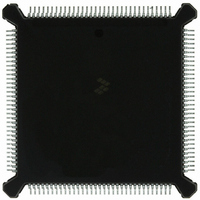MC68332GCEH16 Freescale Semiconductor, MC68332GCEH16 Datasheet - Page 158

MC68332GCEH16
Manufacturer Part Number
MC68332GCEH16
Description
IC MCU 32BIT 16MHZ 132-PQFP
Manufacturer
Freescale Semiconductor
Series
M683xxr
Specifications of MC68332GCEH16
Core Processor
CPU32
Core Size
32-Bit
Speed
16MHz
Connectivity
EBI/EMI, SCI, SPI, UART/USART
Peripherals
POR, PWM, WDT
Number Of I /o
15
Program Memory Type
ROMless
Ram Size
2K x 8
Voltage - Supply (vcc/vdd)
4.5 V ~ 5.5 V
Oscillator Type
Internal
Operating Temperature
-40°C ~ 85°C
Package / Case
132-QFP
Cpu Family
68K/M683xx
Device Core
ColdFire
Device Core Size
32b
Frequency (max)
16MHz
Interface Type
QSPI/SCI/UART
Program Memory Size
Not Required
Total Internal Ram Size
2KB
# I/os (max)
15
Number Of Timers - General Purpose
16
Operating Supply Voltage (typ)
5V
Operating Supply Voltage (max)
5.5V
Operating Supply Voltage (min)
4.5V
Instruction Set Architecture
RISC
Operating Temp Range
-40C to 85C
Operating Temperature Classification
Industrial
Mounting
Surface Mount
Pin Count
132
Package Type
PQFP
Controller Family/series
68K
No. Of I/o's
15
Ram Memory Size
2KB
Cpu Speed
16MHz
No. Of Timers
16
Embedded Interface Type
QSPI, SCI, UART
Digital Ic Case Style
PQFP
Rohs Compliant
Yes
Processor Series
M683xx
Core
CPU32
Data Bus Width
32 bit
Data Ram Size
2 KB
Maximum Clock Frequency
16 MHz
Number Of Programmable I/os
15
Number Of Timers
16
Maximum Operating Temperature
+ 85 C
Mounting Style
SMD/SMT
Minimum Operating Temperature
- 40 C
Lead Free Status / RoHS Status
Lead free / RoHS Compliant
Eeprom Size
-
Program Memory Size
-
Data Converters
-
Lead Free Status / Rohs Status
Compliant
Available stocks
Company
Part Number
Manufacturer
Quantity
Price
Company:
Part Number:
MC68332GCEH16
Manufacturer:
Freescale Semiconductor
Quantity:
10 000
7.3.2 Channel Orthogonality
7.3.3 Interchannel Communication
7.3.4 Programmable Channel Service Priority
7.3.5 Coherency
7.3.6 Emulation Support
7-4
event service time (latency) determines TPU performance in a given application. La-
tency can be closely estimated — refer to Freescale TPU Reference Manual (TPURM/
AD) for more information.
Most timer systems are limited by the fixed number of functions assigned to each pin.
All TPU channels contain identical hardware and are functionally equivalent in opera-
tion, so that any channel can be configured to perform any time function. Any function
can operate on the calling channel, and, under program control, on another channel
determined by the program or by a parameter. The user controls the combination of
time functions.
The autonomy of the TPU is enhanced by the ability of a channel to affect the opera-
tion of one or more other channels without CPU intervention. Interchannel communi-
cation can be accomplished by issuing a link service request to another channel, by
controlling another channel directly, or by accessing the parameter RAM of another
channel.
The TPU provides a programmable service priority level to each channel. Three prior-
ity levels are available. When more than one channel of a given priority requests ser-
vice at the same time, arbitration is accomplished according to channel number. To
prevent a single high-priority channel from permanently blocking other functions, other
service requests of the same priority are performed in channel order after the lowest-
numbered, highest-priority channel is serviced.
For data to be coherent, all available portions of it must be identical in age, or must be
logically related. As an example, consider a 32-bit counter value that is read and writ-
ten as two 16-bit words. The 32-bit value is read-coherent only if both 16-bit portions
are updated at the same time, and write-coherent only if both portions take effect at
the same time. Parameter RAM hardware supports coherent access of two adjacent
16-bit parameters. The host CPU must use a long-word operation to guarantee coher-
ency.
Although factory-programmed time functions can perform a wide variety of control
tasks, they may not be ideal for all applications. The TPU provides emulation capability
that allows the user to develop new time functions. Emulation mode is entered by set-
ting the EMU bit in the TPUMCR. In emulation mode, an auxiliary bus connection is
made between TPURAM and the TPU module, and access to TPURAM via the inter-
module bus is disabled. A 9-bit address bus, a 32-bit data bus, and control lines trans-
fer information between the modules. To ensure exact emulation, RAM module access
timing remains consistent with access timing of the TPU ROM control store.
Freescale Semiconductor, Inc.
For More Information On This Product,
Go to: www.freescale.com
TIME PROCESSOR UNIT
USER’S MANUAL
MC68332











